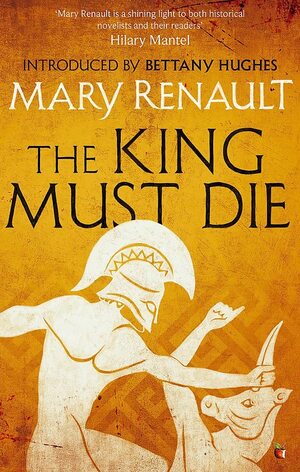‘Listen, and do not forget, and I will show you a mystery. It is not the sacrifice, whether it comes in youth or age, or the god remits it; it is not the bloodletting that calls down power. It is the consenting, Theseus. The readiness is all.' [p. 17]
Definitely a reread, and I can remember when and where I first read it: in the library during study period in my third year at secondary school. I also remembered encountering the quotations from this novel in the chapter-headings of Watership Down, my favourite book when I was nine or ten years old... I remembered most of the details of The King Must Die, despite not having reread in the last couple of decades: I had forgotten (or never noticed) just how many hints of other myths -- Orpheus, an anachronistic Agamemnon, Jason -- are present, and how much they are woven into the theme of goddess-worship.
Theseus grows up in the citadel of Troizen, where his grandfather teaches him about moira, '‘The finished shape of our fate, the line drawn round it. It is the task the gods allot us, and the share of glory they allow; the limits we must not pass; and our appointed end.' [p. 15]. He doesn't know who his father is, but decides after experiencing 'earthquake aura' that it must be the god Poseidon. When he's seventeen, his mother tells him that his father is Aigeus, the King of Athens. Theseus sets out to find him, encountering many adventures en route, and becoming Year-King (doomed to death next year) in Eleusis: and when he reaches Athens, his father's wife Medea tries to poison him.
When it comes time for the tribute to Minos, Theseus is one of the party: seven youths and seven maidens, sent to Crete to die in the Labyrinth. There, he forges a loyal and lucky bull-dancing team; falls in love lust with Minos' daughter Ariadne, a living goddess; foments a rebellion; foresees an earthquake; and elopes from the ruins of Minoan civilisation with Ariadne, who he abandons on Naxos.
All true to the myth: but with the possible exception of the earthquake aura (a sensitivity that many animals possess) none of it is supernatural or mystical, except that Theseus interprets it so. Renault's ancient world is rooted in archaeological evidence and in the tension between the 'sky gods' and the ancient matriarchal religion. Theseus seemed heroic to my teenage self: now I read him as misogynist, violent, arrogant and hot-tempered. (So: heroic!)
I still love this novel: and I still wonder, as I have wondered for nearly fifty years, exactly what Ariadne has in her hand after the Bacchic revels.
Great introduction by Bettany Hughes, too: 'not fact-bound chronicles, but respectful dances with antiquity' [loc. 155]. She stresses that "The ancient Greek muthoi, myths, does not mean fairy-tales, but rather points of information – things seen or experienced to be shared for the benefit of humankind."

No comments:
Post a Comment